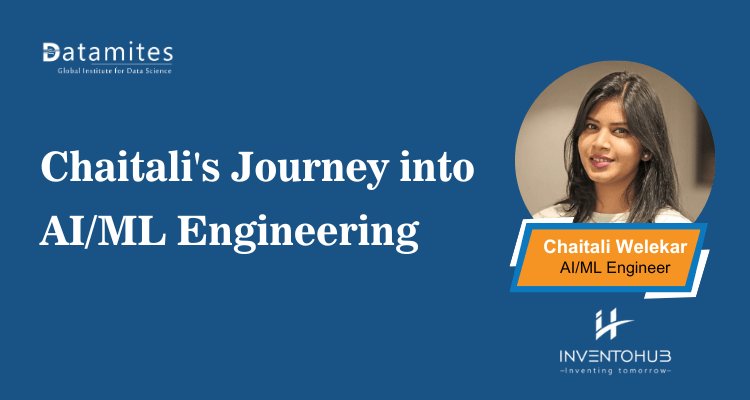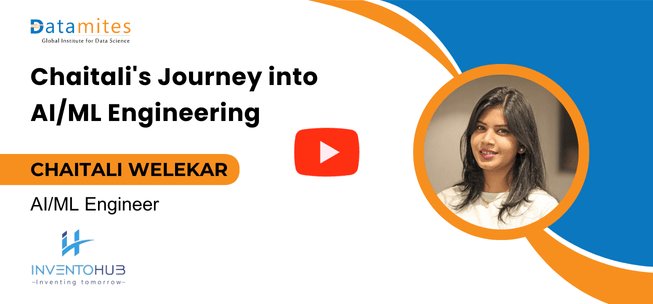From Data Analyst to AI/ML Engineer: Chaitali’s Inspiring Career Journey
Discover how Chaitali transitioned from a Data Analyst to a successful AI/ML Engineer. Learn her strategies, challenges, and key takeaways for building a career in artificial intelligence and data science.

In today’s fast-paced tech world, transitioning from one career path to another can seem daunting especially when it involves stepping into the world of AI and Machine Learning. Meet Chaitali, a seasoned Data Analyst who successfully navigated this journey, transforming her career and skill set to become an AI/ML Engineer. From mastering Python and NLP to building real-world projects that caught recruiters’ attention, Chaitali’s story is a testament to determination, strategic learning, and the power of hands-on experience. Whether you’re a fresher aiming to break into AI or a professional planning a career pivot, her journey offers actionable insights and inspiration to take the leap.
Q&A with Chaitali Welekar: Industry Insights and Actionable Takeaways
Get an insider’s perspective on the AI and ML industry with Chaitali Welekar, a professional who transitioned from Data Analyst to AI/ML Engineer.
Q1: Can you introduce yourself to our readers?
Sure! I have over 8 years of experience in digital marketing, having worked with organizations like Accenture, Cognizant, and the Google Operations Center. In the last 3 years, I worked as a data analyst, which inspired me to explore AI and data science further. I wanted to advance my career by leveraging AI, especially after seeing processes at Google getting optimized using chatbots and other AI tools.
Q2: When and how did you start learning data science?
I began learning data science about 1.5 years ago during my maternity break. I joined DataMites and opted for the online CDS batch. Whenever I had free time, I would go through the courses. The real learning, however, happened when I started working on real-time projects, which helped me apply my theoretical knowledge effectively.
Q3: How did you manage learning during such a busy phase of life?
It was challenging, but I made an important decision to dedicate time solely to learning. For the last 4 months, I started going to the library, focusing 8 hours a day on projects and studies. This helped me build strong practical knowledge, which I showcased on GitHub, attracting recruiter attention.
Q4: What prior experience did you have before joining DataMites?
Before DataMites, I worked as a data analyst using Google Data Studio (Looker Studio). While it gave me analytical experience, it wasn’t as widely used as Power BI or Tableau, so I decided to learn these tools to meet market demand.
Q5: How did you handle learning Python and programming as a non-coder?
Although I had some programming background from MCA and Java, Python was entirely new. I relied on recorded video tutorials and YouTube references whenever I got stuck. This approach helped me understand Python, statistics, and data science concepts, eventually moving on to machine learning and AI.
Q6: What strategy did you follow to transition from an MNC role to data science?
At MNCs, work is highly segmented, limiting overall learning. I wanted exposure to end-to-end processes, which startups can provide. I observed that data science was in high demand with numerous job opportunities. Since I was transitioning from a non-tech role, I needed proper training, so I joined DataMites, which also added value to my resume through placements and certification.
Q7: How many hours per day should a learner dedicate to achieve results quickly?
For serious learners, especially those aiming for a job in 1-2 months, 8 hours per day of focused study is ideal. A quiet, dedicated space like a library helps immensely. The combination of consistent learning and practical application ensures rapid skill growth and better placement opportunities.
Q8: What does your current role as a Digital Marketing Senior Associate entail?
For several months, I worked on SS 360, which involved data analysis for the past month or quarter. Based on this data, we provided recommendations to advertisers. The tools I used included Google Ads, Search Ads 360, and for dashboards, Google Data Studio (Looker Studio). Initially, recommendations were delivered via Google Sheets, but later I transitioned to using Data Studio dashboards.
Q9: Do we need Python, statistics, or ML knowledge for such roles?
Absolutely. Earlier, my experience was tool-focused, which was limiting. I realized that learning the technology behind the tools is more important because tools may change or become obsolete, but concepts like Python, ML, and data analytics remain relevant.
Q10: Were you asked questions related to ML or DL in your interviews?
For my current role, the recruiter was impressed with my profile and GitHub projects, especially in NLP. He did not ask technical questions initially. He even considered offering me a senior role, but I requested to gain real-time project experience first, which he agreed to.
Q11: How did your interviews go, and how did you handle technical questions?
In one interview, I was asked about bootstrap aggregation and other ML techniques. My advice: always link concepts to real-time applications. This helps the interviewer understand that you have practical knowledge, not just theoretical understanding.
Q12: How did you manage career gaps while transitioning to AI/ML?
I left my previous job in August 2024 and maintained continuous GitHub updates. Every month, I uploaded a new ML project, which clearly demonstrated my ongoing learning. If recruiters ask about gaps, you can direct them to your GitHub.
Q13: Does previous experience count when switching to AI/ML?
My previous experience wasn’t in AI/ML, so the company treated me as a fresher in AI/ML. However, prior experience helps in understanding responsibilities like team alignment or collaboration, which is valuable even in entry-level roles.
Q14: What was your biggest takeaway from this journey?
Discipline, focus, and real-world application are key. Understanding market demands, learning the right tools, and dedicating focused time helped me transition successfully from a data analyst to an AI/ML Engineer, even as a non-coder.
Refer these below articles:
- From Electronics to AI/ML: Ajay Yadav’s Path to Success
- Praveen’s Transformation: Student to AI & Machine Learning Engineer
- From Mechanical Engineer to AI Engineer: An Inspiring Journey of Divyansh
Key Findings from Chaitali’s career journey
Here are the key takeaways from her experiences, strategies, and practical learning approach.
- Career Transition Motivation: Chaitali shifted from a Data Analyst role to AI/ML after observing AI-driven process optimization at Google Operations Center.
- Learning During Maternity Break: She began her AI/ML journey during her maternity break, demonstrating that career growth is possible even in busy life phases.
- Hands-On Project Experience Matters: Real-time project work was crucial in applying theoretical knowledge and gaining practical skills.
- Dedicated Focus for Effective Learning: Spending 8 hours a day in a quiet environment like a library accelerated her learning and skill development.
- Importance of Market-Relevant Skills: Prior experience with tools like Google Data Studio wasn’t enough; learning widely used tools (Power BI, Tableau) and technologies (Python, ML) increased employability.
Read these below articles:
- Generative AI and Predictive AI: Key Differences Explained
- Why Artificial Intelligence Matters More Than Ever
- How to Choose the Best Institute for AI/ML in Mumbai?
Chay’s journey shows how dedication, strategic learning, and the right training can transform careers in data science and AI. Her focus on practical projects and market trends offers inspiration for aspiring professionals. According to Grand View Research, the global call center AI market was valued at USD 1,998.7 million in 2024 and is expected to reach USD 7,084.7 million by 2030, growing at a CAGR of 23.5% from 2025 to 2030.
Chennai, known as the “Detroit of India” due to its flourishing automotive and manufacturing sectors, is quickly emerging as a key hub for Artificial Intelligence courses in Chennai. With its strong IT infrastructure, vibrant startup ecosystem, and leading educational institutions, the city is fostering AI research, innovation, and widespread adoption across various industries.
DataMites Artificial Intelligence Institute in Chennai focuses on equipping learners with the skills needed for a successful career in AI. To accommodate diverse learning preferences, Datamites institute offers classroom training at centers in Anna Nagar, Guindy, and Perungudi, live online interactive sessions for remote learners, and self-paced recorded courses for those seeking flexible learning options.

